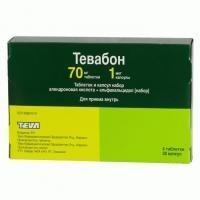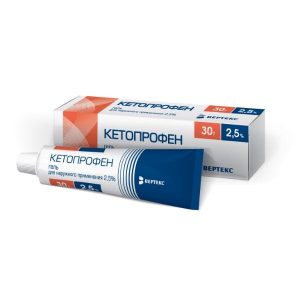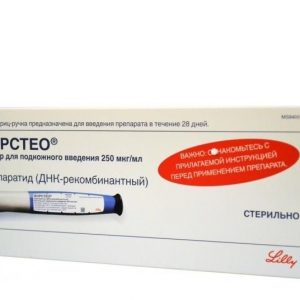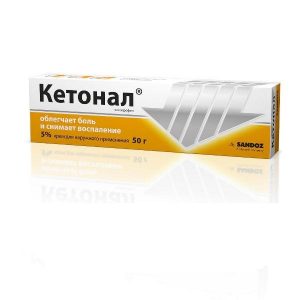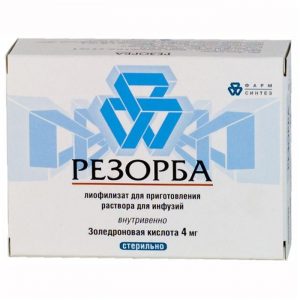Description
Latin name
Tevabon
release form
capsules and tablets.
Pharmacological action
TEVABON – a combined drug for the treatment of osteoporosis.
Alendronic acid, being a bisphosphonate, inhibits the process of active bone resorption caused by osteoclasts, without directly affecting the formation of new bone tissue. Having tropism for bone hydroxyapatite, alendronic acid accumulates mainly in areas of its active resorption. The mechanism of action is associated with the suppression of functional activity and the stimulation of apoptosis of osteoclasts. Against the background of alendronic acid therapy, there is an increase in bone mineralization and an improvement in its quality characteristics.
Alfacalcidol – a regulator of calcium-phosphorus metabolism, a precursor of the active metabolite of vitamin D3 – calcitriol. Increases the absorption of calcium and phosphorus in the intestine, increases their reabsorption in the kidneys, restores a positive calcium balance in the treatment of calcium malabsorption syndrome, reduces the concentration of parathyroid hormone in the blood. Acting on both parts of the bone remodeling process (resorption and synthesis), alfacalcidol not only increases bone mineralization, but also increases its elasticity by stimulating the synthesis of bone matrix proteins, bone morphogenetic proteins, and bone growth factors. In the treatment with alfacalcidol, a bone with a normal histological structure is formed, bone strength increases in all parts of the skeleton.
Alendronic acid and alfacalcidol increase bone strength, while their effects are synergistic due to various mechanisms of action. Inhibition of catabolic processes in bones by alendronic acid is supplemented by the bone anabolic effect of alfacalcidol, which leads to the formation of a normal bone structure. Due to the pharmacological effects of both substances, their use in combination can reduce the potential risk of developing hypocalcemia, hypercalcemia and hypercalciuria. A significant reduction in the risk of fractures is achieved not only due to an increase in bone strength, but also due to the extra-bone (pleiotropic) effect of alfacalcidol – an increase in muscle strength, acceleration of the speed of muscle reaction.
Indications
– postmenopausal osteoporosis
– osteoporosis caused by the use of corticosteroids.
Contraindications
– conditions that slow down the movement of food through the esophagus (including strictures or achalasia of the esophagus)
– patient’s inability to stand or sit straight for at least 30 min
– hypocalcemia
– hypercalcemia
– Burnett syndrome and / or milk-alkaline syndrome (plasma calcium concentration> 2.6 mmol / l, calcium phosphate> 3.7 mmol / L, pH> 7.44)
– severe renal impairment (CC
Alfacalcidol
Assign inside 1 capsule. (1 mcg) 1 time / day in the evening daily. Capsules should be swallowed whole with a sufficient amount of liquid.
The drug Tevabon is intended for long-term use.
Side effects
Side effects are classified according to the following frequency: very often -? 10% often -? 1%, but <10% infrequently -? 0.1%, but <1% rarely -? 0.01%, but <0.1% very rarely - <0.01%, including isolated cases. When using alendronic acid From the digestive system: often – abdominal pain, dyspepsia, sour belching, diarrhea, dysphagia, flatulence, gastritis, gastric ulcer, ulceration of the esophageal mucosa infrequently – nausea, vomiting, constipation, gastritis, gastritis, gastritis, esophagus, melena rarely – stricture of the esophagus, ulceration of the mucous membrane of the oropharynx, perforation of the esophagus, bleeding from the upper gastrointestinal tract (connection with alendronic acid intake has not been established). From the musculoskeletal system: often – pain in bones, muscles, joints, muscle cramps rarely – osteonecrosis of the jaw, mainly in cancer patients taking bisphosphonates, however, similar cases were noted in patients undergoing treatment for osteoporosis with an unknown frequency – proximal stress fracture of the femur, associated or not associated with trauma. From the side of metabolism: rarely – symptomatic hypocalcemia, usually associated with predisposing conditions, hypophosphatemia. From the side of the central nervous system: often – headache. On the part of the sensory organs: rarely – uveitis, scleritis, episcleritis. Allergic reactions: infrequently – rash, itching, erythema rarely – rash associated with photosensitization, urticaria, angioedema very rarely – severe skin reactions, including erythema multiforme exudative (Stevens-Johnson syndrome) and toxic epidermal necrolysis (Lyell’s syndrome). Other: rarely, transient symptoms similar to those in the acute phase of the disease (myalgia, malaise, and fever), usually at the beginning of treatment. When using alfacalcidol From the side of metabolism: rarely – hypercalcemia is very rare – a slight increase in the concentration of HDL in the blood plasma. In patients with severe renal impairment, hyperphosphatemia, heterotopic calcifications in the cornea of the eye and blood vessels are possible. From the digestive system: infrequently – anorexia, vomiting, heartburn, abdominal pain, nausea, dry mouth, a feeling of discomfort in the epigastric region, constipation, diarrhea rarely – a slight increase in the activity of liver enzymes in plasma (ALT, AST). From the side of the central nervous system: rarely – weakness, fatigue, dizziness, drowsiness. From the cardiovascular system: rarely – tachycardia. From the musculoskeletal system: infrequently – moderate pain in the muscles, bones, joints. Allergic reactions: rarely – skin rash, itching very rarely – anaphylactic shock, associated with peanut butter. Due to the multidirectional effect of alendronic acid and alfacalcidol on the concentration of calcium in the blood serum, the use of a combination of these drugs avoids sharp fluctuations in the concentration of calcium in the serum. Drug interaction When taken with food, drinks containing calcium (including mineral water), food additives, antacids and other drugs for oral administration may impair absorption of alendronic acid. In this regard, the interval between taking alendronic acid and other oral drugs should be at least 30 minutes. The combined use of alendronic acid (but not simultaneous administration) with estrogen preparations is not accompanied by a change in their action and the development of side effects. Intake of prednisolone is not accompanied by clinically significant changes in the bioavailability of alendronic acid. corticosteroids increase the side effect of alendronic acid on the digestive tract. With the simultaneous use of alfacalcidol with cardiac glycosides, the risk of developing arrhythmia increases. Inducers of microsomal liver enzymes (including phenytoin and phenobarbital) reduce and inhibitors – increase the concentration of alfacalcidol in the plasma (a change in its effectiveness is possible). Absorption of alfacalcidol is reduced when used together with mineral oil (for a long time), colestyramine, colestipol, sucralfate, antacids, and albumin-based preparations. In this regard, alfacalcidol capsules should not be taken simultaneously with antacids containing aluminum, the interval between taking these drugs should be at least 2 hours. Taking antacids increases the risk of developing hypermagnesemia and hyperaluminemia. Retinol, tocopherol, ascorbic acid, pantothenic acid, thiamine, riboflavin weaken the toxic effect. In perimenopausal women, the effects of alfacalcidol may be enhanced by estrogens. Calcitonin derivatives of ethidronic and pamidronic acids, plicamycin and GCS reduce the effect of alfacalcidol. Alfacalcidol increases the absorption of phosphorus-containing drugs and the risk of hyperphosphatemia. The simultaneous use of alfacalcidol with calcium preparations, thiazide diuretics can cause hypercalcemia, due to increased absorption of calcium in the intestine, increase its reabsorption in the kidneys. Against the background of therapy with alfacalcidol, other vitamin D drugs and its derivatives should not be prescribed because of the possible additive interaction and increased risk of developing hypercalcemia. Overdose Alendronic acid Symptoms: hypocalcemia, hypophosphatemia, diarrhea, heartburn, esophagitis, erosive and ulcerative lesions of the gastrointestinal mucosa are possible. Treatment: taking milk or antacid to bind alendronic acid. Due to the risk of irritation of the esophagus, vomiting should not be induced. The patient should be upright. Alfacalcidol Early symptoms of hypervitaminosis D (caused by hypercalcemia): diarrhea, constipation, nausea, vomiting, dry mouth, anorexia, metallic taste in the mouth, hypercalciuria, polyuria, polydipsia, pollakiuria / nicturia, weakness, mytomy, headache, bone pain. Late symptoms of hypervitaminosis D: dizziness, confusion, drowsiness, cardiac arrhythmias, skin itching, increased blood pressure, conjunctival hyperemia, nephrolithiasis, weight loss, photophobia, pancreatitis, gastralgia rarely – changes in the psyche and mood. Symptoms of chronic vitamin D intoxication: calcification of soft tissues, blood vessels and internal organs (kidneys, lungs), renal failure, cardiovascular failure, impaired growth in children. Treatment: discontinue the drug. In the early stages of acute overdose, the use of mineral oil can have a positive effect (which helps to reduce absorption and increase the excretion of alfacalcidol with feces). In severe cases, hydration is carried out with the introduction of infusion saline solutions, loop diuretics, corticosteroids, bisphosphonates, calcitonin are prescribed, hemodialysis is performed using solutions with a low calcium content. It is necessary to control the content of electrolytes in the blood, kidney and heart function (according to ECG), especially in patients receiving digoxin. There is no specific antidote. Storage Conditions At a temperature not exceeding 25 ° C. Expiration 2.5 years Active ingredient Algeldrat, Benzocaine, Alfacalcidol set Terms leave through pharmacies In retseptu lekarstvennaja form kapsul Teva Pharmaceutical Enterprises Co., Ltd. Israel
